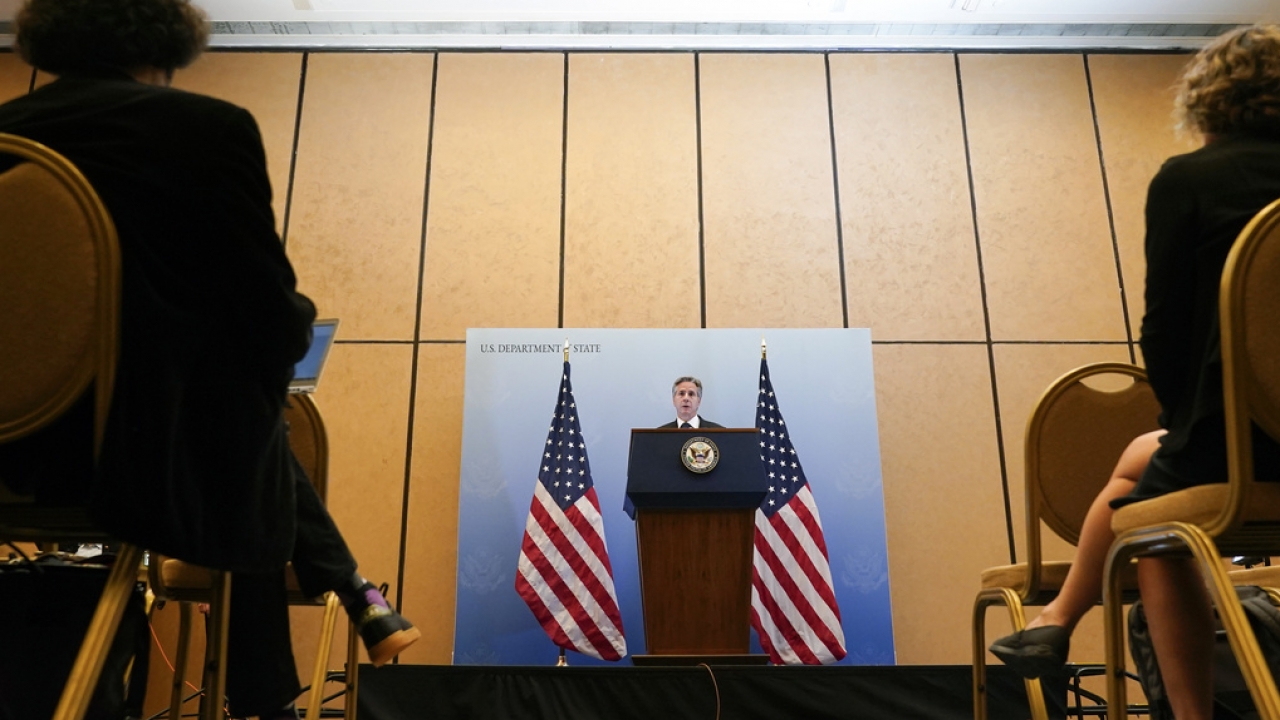The U.S. and Qatar have reached an agreement that the Qataris will not act on any request from Tehran for the time being to access $6 billion in Iranian funds that were unblocked as part of a prisoner swap last month, a U.S. official said Thursday.
The move, which stops short of a full refreezing of Iranian funds in Qatar's banking system, follows the deadly attacks by Hamas on Israel and continued Republican criticism of the Biden administration's deal with Iran, in which $6 billion was unfrozen in exchange for the release of five detained Americans. The official who outlined the understanding between the U.S. and Qatar was not authorized to comment and spoke on condition of anonymity.
U.S. officials have strenuously pushed back against the criticism, noting that the money had yet to be spent by Iran and can only be used for humanitarian needs.
"None of the funds that have now gone to Qatar have actually been spent or accessed in any way by Iran," Secretary of State Antony Blinken told reporters in Israel on Thursday when asked about the funds. "Indeed, funds from that account are overseen by the Treasury Department, can only be dispensed for humanitarian goods — food, medicine, medical equipment — and never touch Iranian hands."
The White House has said it has yet to uncover information that Iran was directly involved in the multipronged Hamas operation — the biggest attack on Israel in decades. Even so, Iran is the principal financial and military sponsor of Hamas. U.S. officials have said their intelligence does not show a direct role by Iran and have not pointed blame at Tehran.
As Israel prepares to escalate retaliatory action against Hamas militants for the weekend attacks, the White House announced the U.S. government will begin evacuation flights on Friday for Americans who want to leave Israel.
In a deliberate show of support for Israel, a U.S. official confirmed that U.S. Defense Secretary Lloyd Austin plans to visit on Friday, following Thursday's visit by Secretary of State Antony Blinken.
Austin is expected to meet with Prime Minister Benjamin Netanyahu and Defense Minister Yoav Gallant to determine what additional military aid is needed in the war with Hamas, said the U.S. official, who spoke on condition of anonymity to discuss sensitive travel details
Speaking to reporters in Brussels on Thursday, Austin said the U.S. is "working urgently to get Israel what it needs to defend itself, including munitions and our iron Dome interceptor interceptors."
The White House confirmed that the death toll in the fighting now includes at least 27 Americans, while 14 more U.S. citizens in Israel remain unaccounted for. The White House has said a "handful" of Americans are among the dozens of people that Hamas took hostage.
U.S. officials estimate 160,000-170,000 Americans are in Israel, as residents, tourists or in some other capacity. An estimated 500 to 600 American citizens are in Gaza, including people who have been working as humanitarian workers or visiting relatives. Israel has sealed its crossing out of Gaza as part of a harsh siege on the territory since Saturday's Hamas attacks. And Gaza's sole crossing point with Egypt was forced to close after Israeli airstrikes hit nearby.
The U.S. government is arranging for at least four charter flights a day out of Israel, according to people familiar with the planning.
The State Department said it expects to facilitate the departure of thousands of U.S. citizens per week from Israel. The overall security situation, availability and reliability of commercial transportation, and U.S. citizen demand will all influence the duration of this departure assistance. The department asked U.S. citizens in need of evacuation assistance to complete the crisis intake form at travel.state.gov.
There are still some commercial carriers flying in and out of Tel Aviv's Ben Gurion airport, and ground routes are open to leave Israel. White House officials, however, have voiced concern that those options may not be feasible or affordable for some Americans in Israel who want to leave.
Blinken visited Israel on Thursday to meet with Netanyahu and Israeli citizens. He was joined by the deputy special representative for hostage affairs, Steve Gillen, who will stay in Israel to to support the efforts to free the hostages.
Blinken said Americans would continue pushing regional countries for a safe passage in and out of Gaza, which could help the hundreds of American civilians trapped in the blockaded enclave.
Israeli defense officials have yet to order a ground invasion of the pummeled territory, but have been planning for the possibility. The military has called over 300,000 reservists into action in preparation.
Meanwhile, President Joe Biden and Vice President Kamala Harris, who joined from Air Force Two en route to Las Vegas met on Thursday with senior administration officials to discuss efforts to safeguard the U.S., including Jewish, Arab and Muslim communities, following the Hamas attacks in Israel.
Biden administration officials have been speaking with lawmakers about the contours of a supplemental aid package as it continues to determine Israel's needs.
Some key Republicans, including House Foreign Affairs Committee Chairman Michael McCaul, R-Texas, have advocated for a larger package that would lump in funding for Ukraine, Taiwan and border security along with Israel aid, and the White House has started to prepare such a package, according to an official familiar with the deliberations. The person was granted anonymity to speak about private conversations, and no final decisions have been made on a supplemental package.
The White House has indicated that it will send the new request to lawmakers next week, when both chambers are back in Washington. Its legislative affairs staff is set to brief senators on Friday afternoon about "ongoing national security needs," according to another official granted anonymity to confirm a private meeting.







